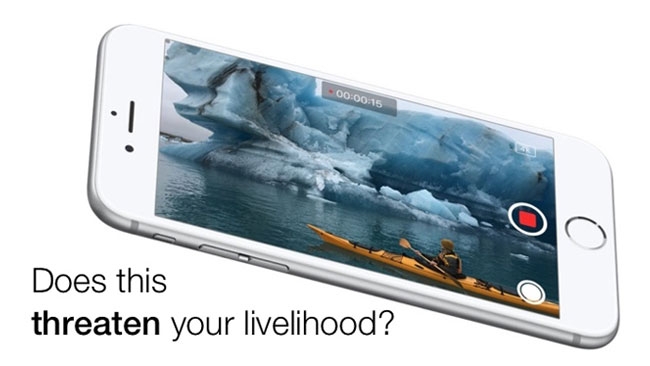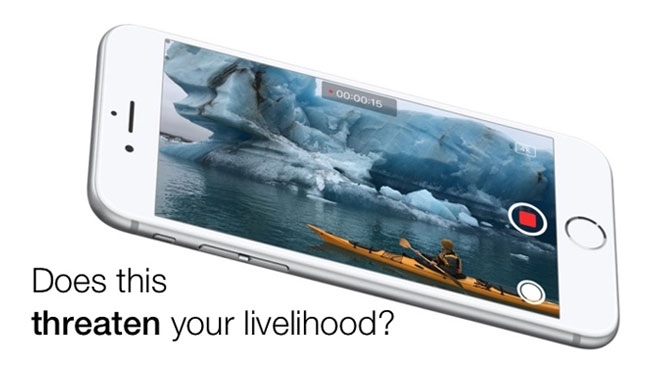

RedShark Replay: Video pros are losing jobs as companies produce more video themselves, often starting with a consumer-level product like the iPhone. However, there are ways that you can still stay in the game.
Today, I did something that I have been putting off doing for a long time. I flexed my knuckles, sucked some air through my teeth and I bought myself a new iPhone – a 6S to be precise. My aging old 4S battery had started to act up and my phone kept switching off at inopportune moments. Mind you, the sluggishness of its interface under the latest iOS had been driving me a bit bonkers for a while, too. So, I finally took the plunge and ordered a new one.
I then proceeded to do what any self-respecting person who has just purchased a new toy does. I perused the Apple website, as well as Vimeo and Youtube, and I saw the amazing examples of what the camera can do. I watched with wonderment at the incredible 4K video that it was capable of. I thought to myself that, finally, I wouldn't have gear regret if I only had my iPhone in hand to take a picture or a bit of footage. I imagined all those places I could shoot wonderful slow motion in. The sun was shining and everything was in violet hues…
The flip-side
Unfortunately, this very same day, it appears that one of my clients had been doing exactly the same thing! As a result of this, I have now lost a potential job to Apples' marketing machine. The client in question wasn't small, either, and had been a regular of mine for some years now.
I can't blame them. In the video world, the battle to convince clients that what we do has value and a high level set of skills associated is one of a serious uphill gradient. How hard can it be to point the camera and record an interview?
I don't begrudge them their decision and I am sure I will work for them again. I will be sure to be here when they need me – I may well be giving them some training on how to get better footage.
Counter intuitive? Not quite. Sometimes for smaller videos, the figures don't add up to bring in people like me, while they may well still require professional services for the bigger jobs. I can help to give them value through my services and expertise, even if I am not directly involved in a shoot.
Everything has its costs
Having said that, many companies discover how difficult it is to produce good video once they try it for themselves. But what has to be understood is that self-producing a video, when you don't have the relevant knowledge and skill set, has its own costs. Purchasing the right gear for the job is a material costs, but there are other, more important costs to consider.
The first is reduced productivity. Time that a company's staff spend creating videos is time that they are not spending on their main job. If they have to juggle both while being expected to achieve a professional result, how successful do you think that will be in the long term?
The second is the reduced effectiveness of the video. As producers we are communications specialists. If your video is ineffective at putting the message across to your audience successfully, then you will have wasted your time and money.
The paradigm is this. If something went wrong with your car engine, would you take it to a specialist or do it yourself? You could do it yourself if you had a mechanical mindset. But no doubt it will take you much longer, and you might risk making the problem worse!
There are lots of professions for which we could undertake doing their service for ourselves, but mostly we don't. It is often too much effort, and it is much better to bring in an expert to do it efficiently. We pay them to do a good job.
Yet video often isn't seen in this way, quite often due to the way that products such as the new iPhone are marketed. We are told that focus is easy at the touch of the screen, stabilisation will give you rock steady shots even in a hurricane, and exposure is a cinch. Nothing is mentioned about the examples on the Apple site having being created by video and photographic professionals! Nothing is mentioned about lighting, capturing sound, and a knowledge of how to capture all this in a way that can be edited into a cohesive story.
In defense of experience and skill
That my friends is where skill and experience come in. Effective video is not produced by numbers. Most RedShark readers know this already. But the tricky part is to get potential clients to understand this.
Unfortunately my client had fallen for the idea that because a particular camera in a phone can create a really good picture, that they would be able to bypass all the skills necessary to make that camera work well.
Sometimes though, we need to allow people space to find out these things for themselves. Should we be afraid of clients going off and trying such things? I don't believe so. The clients who still have demands over the quality of the final product will no doubt come back to us. Those who are happy with their own results, no matter how bad, will likely never be persuaded. But we can potentially teach them how to get better video via paid tuition. This way you are turning a negative into a positive. There may come a point where a video idea is simply too big for them to take on themselves, and they will require the services of a professional.
In the meantime, remember kids, the camera doesn’t make the video for you!
Tags: Production



Comments